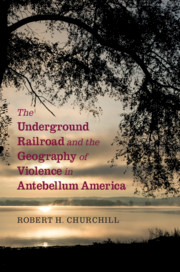Book contents
- The Underground Railroad and the Geography of Violence in Antebellum America
- The Underground Railroad and the Geography of Violence in Antebellum America
- Copyright page
- Dedication
- Contents
- Maps
- Acknowledgments
- Introduction
- Part I Origins to 1838
- Part II 1838–1850
- Part III 1850–1860
- 5 Law and Degradation
- 6 Above Ground
- 7 The End of Toleration
- Epilogue
- Appendix
- Index
7 - The End of Toleration
The Collapse of the Fugitive Slave Act in the Contested Region
from Part III - 1850–1860
Published online by Cambridge University Press: 16 December 2019
- The Underground Railroad and the Geography of Violence in Antebellum America
- The Underground Railroad and the Geography of Violence in Antebellum America
- Copyright page
- Dedication
- Contents
- Maps
- Acknowledgments
- Introduction
- Part I Origins to 1838
- Part II 1838–1850
- Part III 1850–1860
- 5 Law and Degradation
- 6 Above Ground
- 7 The End of Toleration
- Epilogue
- Appendix
- Index
Summary
The chapter explores the collapse of the Fugitive Slave Act of 1850 in the Contested Region. The overland Underground Railroad networks in the region were quickly being bypassed by the railroad transportation in the 1850s. Nevertheless, the high-profile fugitive rescues in the Free Soil Region convinced slave catchers that their efforts were better focused farther south, and as a result slave catching accelerated in the Contested Region in the middle and late 1850s. This led to a series of confrontations in which the behavior of the slave catchers and accompanying US Marshals was egregiously violent. Attempts by local and state authorities to bring the assailants to justice were frustrated by federal judges who fully sanctioned their recourse to the violence of mastery. These cases rendered the region’s conditional toleration of slave catching untenable. The result was a striking shift in the culture of violence as the region embraced the outright defiance that had long characterized Free Soil communities. As a consequence, in the late 1850s, the enforcement of the Fugitive Slave Act collapsed outside the narrow strip of territory that comprised the Borderland.
Keywords
- Type
- Chapter
- Information
- Publisher: Cambridge University PressPrint publication year: 2020

